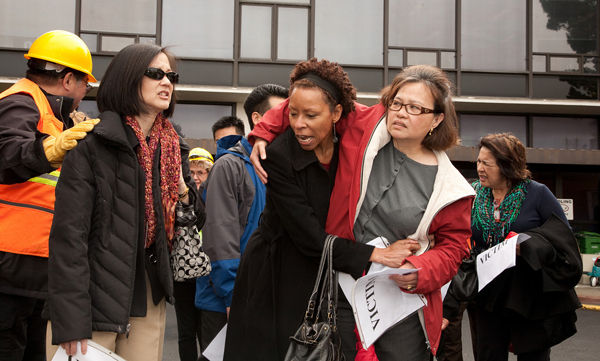Disaster Preparedness: Are You Ready?
UCSF Offers Specialized Training in Emergency Response

In recognition of National Disaster Preparedness Month in September, the UCSF Police Department is leading several initiatives to keep the UCSF community safe, including offering specialized training in emergency response.
Editor's note: This is the first in a series of stories this week as UCSF marks National Preparedness Month in September.
Disaster can strike at any time without warning. Knowing what to do in an emergency can reduce the impact the situation has on you, your co-workers and your family and friends.
Eighty percent of UCSF faculty and staff commute from the north, east and south bay. If the next major earthquake strikes during work hours at UCSF, 20,000 or more students, faculty staff, affiliates and visitors may be unable to leave campus due to damage and closure to roads, bridges, and transportations systems.
Related Stories
San Francisco’s first responders – the San Francisco Fire Department, Emergency Management Services and others – will be overwhelmed and often unable to move throughout the city due to debris, damage and grid-locked streets and roads.
During the first 24 to 48 hours after an earthquake affecting the San Francisco and other cities in the Bay Area, the initial responders will be citizen responders: you, your co-workers and other members of the UCSF community. Will you be ready?
From earthquakes to bomb threats to campus shootings, the UCSF Police Department and its Homeland Security Emergency Management Division offers training to help you and your co-workers prepare for handling a chaotic event.
Volunteer Opportunities
The UCSF community offers a number of ways to become involved in emergency preparedness and response at this University. Here are a few:
EAP Floor Wardens are first-line responders who assist in safe evacuations and identify the location of trapped, injured, or disabled victims in need of extraction or rescue. EAP floor wardens are being offered the advanced Campus Emergency Response Team (CERT) and Care and Shelter Team (CAST) training listed below starting in Fiscal Year 2013.
Campus Emergency Response Team (CERT) members assist in disaster response using basic first-responder skills. After a disaster, professional first responders will be overwhelmed, leaving many citizens on their own for the first 72 hours. CERT members work as a team to assist victims of a disaster. The program is an all-hazards, all-risk response from trained UCSF staff, students, faculty and affiliates. No special skills or education is required to join; all training will be provided to those who volunteer.
Emergency Communications Team (ECT) members are volunteer HAM radio operators who help pass vital information between first responders, command posts, and the UCSF Emergency Operations Center (EOC) when conventional phone and cell phone systems are damaged or overloaded during emergencies. A HAM radio operator’s license is not required to join the team, but may be required after you join depending on the type of radio used. Purchase of a radio is not required, but recommended. UCSF will issue ECT members handheld radios when deployed to the field.
Care and Shelter Team (CAST) members consists of UCSF employees who are trained and organized to help their fellow UCSF community members during a disaster. CAST is tasked with operating emergency shelters, which provide disaster information, food and water, and a place for rest and safety for UCSF students, staff, faculty, patients, visitors and affiliates displaced during a disaster.
Disaster Mental Health Team (DMHT) is comprised of staff, faculty, and students. Some DMHT members are lay community members (non-mental health professionals) who receive training in psychological first aid or other elements of disaster mental health identified by the UCSF Disaster Mental Health Workgroup.
DMHT is also comprised of UCSF mental health professionals who are assigned or volunteer to provide crisis counseling or other appropriate mental health services to disaster victims and responders.
September is National Preparedness month. This is just one example of how UCSF Police and its Homeland Security & Emergency Management Division are making UCSF Prepared. For more information or to volunteer, email or visit the website here.
Christopher Jones is director of the Homeland Security Emergency Management Division for the UCSF Police Department.